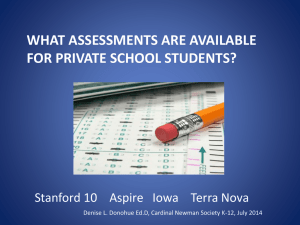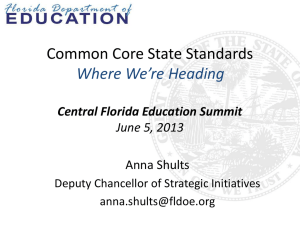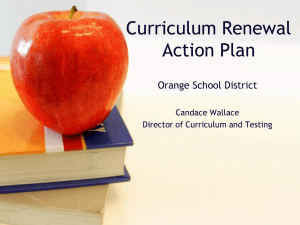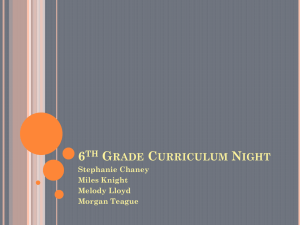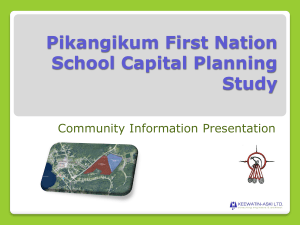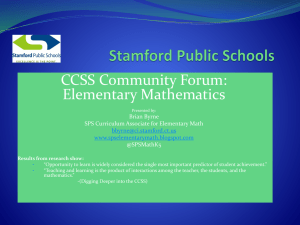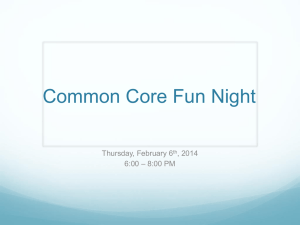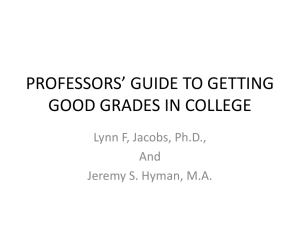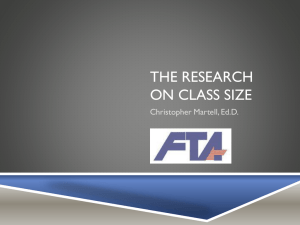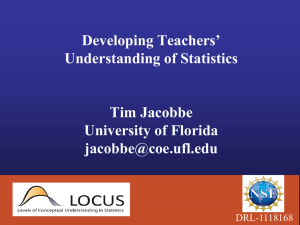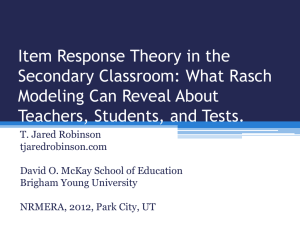How American Students Measure Up
advertisement
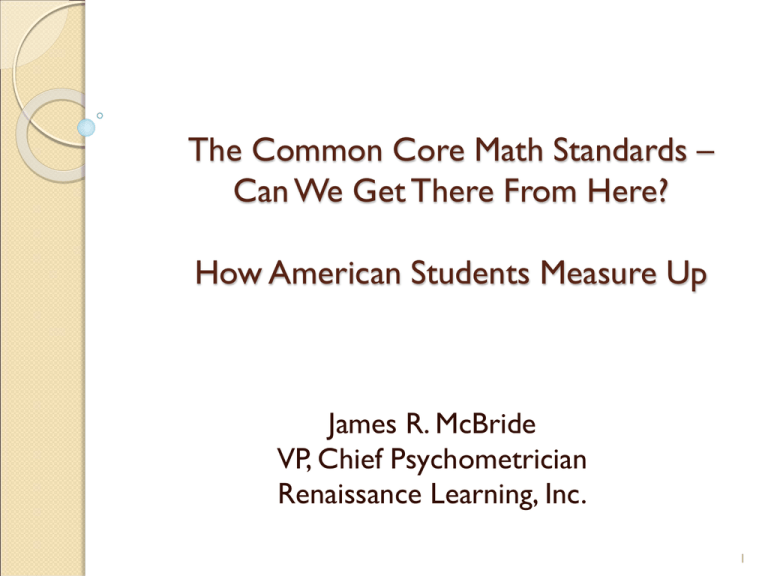
The Common Core Math Standards – Can We Get There From Here? How American Students Measure Up James R. McBride VP, Chief Psychometrician Renaissance Learning, Inc. 1 Outline Background Methods Results Interpretation Next Steps 2 Background In 2010, the National Governors’ Association (NGA) and the Council of Chief State School Officers (CCSSO) developed the Common Core State Standards in Math and English/Language Arts. Designed to help make U.S. students more competitive internationally, the Common core standards are intended to be higher than current standards, with college and career readiness as their end goal. To date, all but a handful of U.S. states and territories have adopted them, and are now working to revise state curriculum standards to reflect the “Common Core” standards. 3 Two federally-funded consortia of states have been formed to develop innovative assessment systems based on the Common Core. Common Core summative assessments are scheduled for first use in state accountability testing in the 2014-2015 school year. Little is known about how U.S. students currently perform relative to these new standards. Renaissance Learning has initiated a program of research to provide advance information about the status of US students relative to the Common Core Math Standards. 4 Project Overview Each year, several million K-12 students take STAR Math, Renaissance Learning’s computerized adaptive interim assessment of general math achievement. Beginning in 2008, Renaissance Learning has developed and field tested almost 10 thousand new STAR Math items measuring more than 500 standards-based skills, and calibrated them using the Rasch model. Thousands of those items have been aligned to the new Common Core Math Standards. Selected items that align to the Common core were chosen for use in a research program designed to provide an early appraisal of U.S. proficiency on some of the Common Core Math Standards. What follows is a summary of the design of that research, as well as the early findings. 5 Methods The study consists of a number of Common Core-aligned items embedded as “experimental items” in STAR Math, and randomly chosen for administration to the universe of students taking STAR Math on the Renaissance Place RealTime™ platform. Response data from that platform is available to Renaissance Learning for research use. 6 Standards 2011, Spring and Fall: -- 52 CCSS skills/objectives -- spanning grades 1 through 10, These were deemed exemplars of the core standards. 2012, Spring: -- 7 additional standards were added. 7 Test Items 2011, Spring and Fall: -- 105 CCSS-aligned STAR Math items -- 2 to 15 items per grade -- 2 or more items per objective 2012, Spring: -- 14 more items were added -- 119 items in all 8 Item Counts by Domain and Grade Level Domain Item Grade Level 1 2 2 0 3 0 4 0 5 2 6 0 7 2 8 2 9 10 Total 4 2 14 Data Analysis & Statistics 0 2 0 0 0 0 0 0 0 0 2 Geometry & Measmt 2 0 0 2 5 2 0 4 0 0 15 Numbers & Operations 14 7 10 12 6 2 0 88 Total 18 10 16 15 14 12 14 12 6 2 119 Algebra 8 16 13 9 Students All students taking STAR Math on the RP RealTime™ platform took one or more unscored CCSS-aligned test items, randomly chosen from the grade-specific sets of items -- random assignment of items to students -- items embedded in random positions within the STAR Math tests. Most students took 1 or 2 Common Core-aligned items. Each item was administered to students in its target grade, as well as the next higher grade. 10 Time of Year 2011, Spring: Data from May and June 2011 – End of the 2010-11 school year -- More than 200,000 students 2011, Fall: Data from August and September 2011 -- Start of the 2011-12 school year -- More than 300,000 students 2012, Spring: Data from mid-April – mid-May 2012 -- End of the 2011-12 school year -- More than 450,000 students -- 3,259 schools 11 Student Data in the 2012 Study: 462,845 students 3,259 schools Number Grade of Tests 1 58,248 Grade 6 Number of Tests 31,574 2 79,306 7 23,417 3 91,256 8 25,456 4 78,765 9 9106 5 57,408 10 8309 12 Outcome Variables Percent Correct was calculated for each Common Core-aligned item. On-grade percent correct was the variable of primary interest. Other item statistics, including item-score correlations and Rasch difficulty parameters, were calculated but are not reported here. 13 Selected Results 14 Average Rasch Item Difficulty By Grade 4.00 3.00 2.00 1.00 0.00 -1.00 1 2 3 4 5 6 7 8 9 10 -2.00 -3.00 -4.00 -5.00 15 Average Percent Correct Overall: 59% 70% 60% 50% All 40% 30% 20% 10% 0% Average Percent Correct 16 Average Percent Correct by Grade 80% 70% 60% 50% 40% 30% 20% 10% 0% All 1 2 3 4 5 6 7 8 9 10 17 Interpretation -- Overall proficiency level (59%) is misleading, due to large differences among grades. -- Grades 1-3 overall proficiency seems satisfactory now, even though CCSS is not yet implemented. 18 -- Steady decline from grade 4 to 10 gives pause. What does it signify? - Difficulties ahead? - Differences between 20102012 curricula and CCSS? - Is it attributable to curriculum? Instruction? Teacher preparation? More than one of these? 19 Percent Correct Spring 2011 (x-axis) vs. Spring 2012 (y-axis) 105 original HASMU items 100% 80% 60% Reference Line 40% 20% 0% 0% 20% 40% 60% 80% 100% 20 - Percent correct on each item hardly changed from Spring 2011 to Spring 2012 -- Average difference =1% -- Little variation (SD = 2%) - -Remarkably similar results both years -- Suggestive of a “stable system”? -- Will implementation of CCSS make a difference? -- How large? -- How soon? 21 Percent Correct Fall 2011 and Spring 2012 100% 80% 60% Reference line Grades 1-3 40% Grades 4-6 20% Grades 7-10 0% 0% 20% 40% 60% 80% 100% 22 - Percent correct did increase from Fall 2011 to Spring 2012 -- Largest changes: Grades 1 to 3 -- Smaller changes: Grades 4-6 -- Least change: Grades 7-10 -What does this suggest? -- Closer alignment of current curricula to CCSS in lower grades? -- More effective instruction there? -- Do younger kids just grow faster? 23 -- “Can we get there from here?” 24 Next Steps -- Technical report on 2010-12 study -- Replicate for 2012-13 with expanded scope - Assess Fall-Spring 2012-13 growth - Expand coverage of CCSS content - Still too early to see impact of CCSS-based curricula? 25 Questions For further information: james.mcbride@renlearn.com 26
